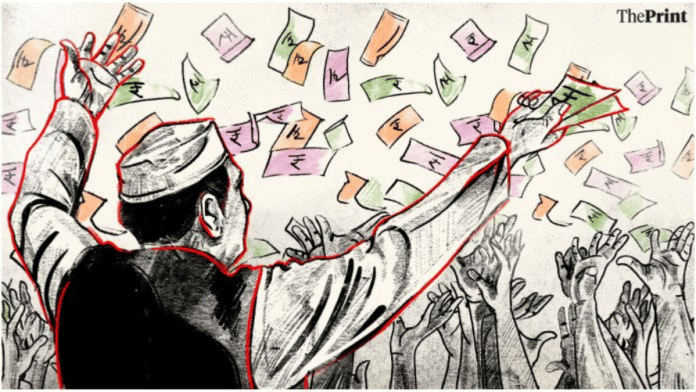Thank you dear subscribers, we are overwhelmed with your response.
Your Turn is a unique section from ThePrint featuring points of view from its subscribers. If you are a subscriber, have a point of view, please send it to us. If not, do subscribe here: https://theprint.in/subscribe/
No polestars or political commentator have ever predicted such a landslide victory for ruling parties in Maharashtra. Generally winning and losing elections always depend on combination of factors rather than a single factor; however a dominant issue or narrative is visible in every election. In recent elections of Maharashtra and Jharkhand, it is noticed – direct money transfer programs like “ Majhi Ladki Bahin Yojna” and “Mukhyamantri Maiya Samman Yojna” played a crucial role for repeating the incumbent governments , same was noticed in Madhya Pradesh earlier too. If we go into the history then we may notice –it is J Jayalalitha of Tamil Nadu who has bucked the trends, where she got reelected in 2016 with her popular welfare schemes like giving cycles, laptops, TVs, Mangalsutra etc. These programs got a huge credit for her return to the power.
It is very evident by now that; political parties are slowly moving towards direct money transfer schemes from distributing the goods. At present, it is very difficult to predict where this competitive politics shall end with; because all political parties are indulging more or less in same practices. It is very much evident that, Women as a whole slowly becoming a “vote bank”. Political parties are developing women centric schemes that are essentially meant to attract women electors who are in a significant number. Women voters are no more influenced by their male counter part’s advice or directions, even they do not discuss about their preferences.
Following chart is an illustration about high turnout of women voters, popular scheme and Result:
| Election Date | State | Popular Scheme | Women Voter Turn Out | Result |
| Nov,2024 | Maharashtra | Majhi Ladki Bahin Yojna | 65.22% (6% higher from 2019) | Mahayuti (Incumbent Govt) | Nov,2024 | Jharkhand | Mukhyamantri Maiya Samman Yojna | 70.46% (5% higher than male voter) |
| May,2024 | Odisha | Subhadra Yojna | 75.55% ( 2.18% higher than male voter) | BJP |
| Nov,2023 | Madhya Pradesh | Ladli Behena | 76.03% (2% higher from 2018) | BJP (Incumbent Govt) |
| May,2023 | Karnataka | Gurantee Scheme/ Griha Lakshmi | 72.7% (4% higher from 2018) | Congress |
| State | Inflation Rate as on Oct,24 (based on CPI) |
| Maharashtra | 5.38% |
| Jharkhand | 5.53% |
| Odisha | 7.51% |
| Madhya Pradesh | 7.03% |
| Karnataka | 5.91% |
Source:-Ministry of Statistics and Program Implementation
Even though India’s consumer price inflation is hovering around 6% at national level, education inflation is significantly high around 8-10%. This means that the cost of education could double every 6 to 7 years. At the same time multiple reports confirm that Medical inflation has reached to 14%. So now the question is – is political optics about direct money transfer program actually helping individuals other than the transactional value? High inflation and expenditure towards freebies are going to burden the individuals directly or indirectly.
Naturally, political parties will keep on finding new vote catchment (vote bank) areas with data analytics. So vote bank politics will be remain as real, however the freebie culture going to cause a significant impact on the overall economy. Non merit freebies will have huge impact on future oriented infrastructure projects. Recent economic crisis in Srilanka is a good reminder about debt sustainability. According to the World Bank, 50 countries are verge of economic collapse and 104 countries are just balancing their act. A large no countries in the world are not economically sustainable due to food crisis, ongoing war, climate change & petro chemical inflation. Twenty countries may never be able to repay their debt and that can lead these countries to be modern captivity of economically powerful nations.
India as a country need to be vigilant towards the debt ratio, the way debt is increasing for the states can pose a significant challenge for India. Several states spend more than 10% of their revenue expenditure on subsidies. Financial burden on the exchequer will also exert upward pressure through market borrowing.
In coming 2 years , we shall see assembly elections in Delhi, Bihar , Kerala and West Bengal .Competitive politics through non merit freebies can add more financial burden to these state’s exchequer as many of these state’s debt –GSDP ratio is already skewed.
In conclusion, it is very important for political parties to differentiate between welfare schemes and freebies; when welfare schemes positively impact the lives – non merit freebies are not fair practice. Institutions like ECI should provide a level playing field to all participants of democracy including non-beneficiary voters. Programs focusing on education, healthcare, skill development and infrastructure will create a foundation for long term well-being. No one should be left behind in the pursuit of overall well-being including the tax payers. Policies should focus on enhancing the capabilities through which individual can better his/her quality of life rather than optics of high income.
These pieces are being published as they have been received – they have not been edited/fact-checked by ThePrint.


